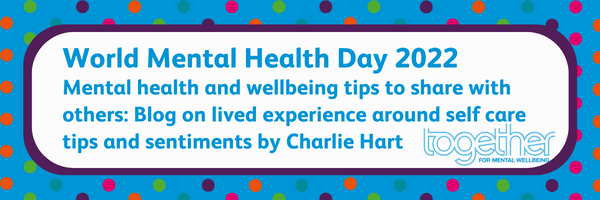WMHD 2022: Blog on lived experience around self care tips and sentiments by Charlie Hart

World Mental Health Day takes place on 10 October and the theme for 2022, as set by the World Health Organisation, is ‘Make mental health & well-being for all a global priority’. We see this theme as focussing on increasing access to knowledge and support relating to mental health wherever possible globally and thought about how we could contribute.
As we value lived experience as an organisation, with our core principle being service user leadership, we thought we could help by inviting our staff, volunteers and people who use our services to share their knowledge and insight through tips that have worked for them in supporting their mental wellbeing. We hope this is a way we can help others by sharing the understanding people have gained from their own experiences and our overall question was:
- What are some of your tips for aiding your mental health and wellbeing you’d want to share with others experiencing mental distress?
Charlie Hart is Human Resources Analyst at Together and has written a blog reflecting on her own mental health lived experience and how some of the sentiments around awareness days affect her personally. Charlie talks openly about her own experiences including the tragic loss of her son who took his own life describing self-care practices that have worked for her.
Content warning: discussion of suicide
 “It’s OK not to be OK”, so the well-meaning slogan goes. That slogan bugs my daughter, who suffers from moderate depression and severe anxiety. She cannot access treatment through Child and Adolescent Mental Health Services (CAMHS) (she was told she does not exhibit anxiety over and above what can be expected in an autistic teenager) and would feel uncomfortable talking about her feelings anyway.
“It’s OK not to be OK”, so the well-meaning slogan goes. That slogan bugs my daughter, who suffers from moderate depression and severe anxiety. She cannot access treatment through Child and Adolescent Mental Health Services (CAMHS) (she was told she does not exhibit anxiety over and above what can be expected in an autistic teenager) and would feel uncomfortable talking about her feelings anyway.
She cannot get prescribed antidepressants due to her age. She does not consider it “OK” to suffer and struggle like she does.
As a late-diagnosed autistic adult with alexithymia (problems recognising my own emotions), I don’t always know when I am not OK. “How are you?”, people ask, but often I don’t know the answer and just shrug. The well-meaning copy/paste sentiment that bugs me is “It is good to talk, my door is always open, the kettle is on” because to me that is not enough. I personally need those who care to notice something is wrong and actively reach out to me.
My son ended his life in April 2019, aged 15, since then I get asked “how do you cope?”. My answer: “I wasn’t given a choice”, or, if I am feeling facetious, “oh you know, hanging in there”. Sometimes, I can even talk calmly and bluntly about what I have been through, not just the loss but the horrors of how it happened. Well, I may appear calm on the surface, but the tell-tale signs are my words tumbling out too quickly and my breath quickening. Often with alexithymia a tidal wave of emotion is starting to swirl under the surface, gathering force ready to sweep me away as soon as I stop rushing from one activity to another and notice it’s there.
Yes, we all have bad days and low moods, but if you are often full of dread, if you often have a low mood, or are plagued with intrusive thoughts, or lying awake ruminating into the small hours, having panic attacks… it is important then to learn to take a breath and consciously tune in. Most of us will experience mental distress at some time in our lives and yes there are documented typical signs, but our brains are unique, and the symptoms or warning signs are personal and individual. Anxiety to me, for instance, feels like a writhing bag of snakes in my belly, so I struggle to eat, my sensory sensitivities worsen. I notice the physiological effects before the feelings.
My tip would be to learn when to practice self-care if you can and what works for you. Try to establish when and how to lean on your support network, and when to seek professional treatment and/or medication. Self-care for me might look like getting out in the fresh air and putting one foot in front of the other with changing scenery. Or, it may be taking some time to blog about my spiralling worries and nagging doubts, taking the sting out of those what-ifs and maybes.
I find actively seeking what I call “glimmers” helps too; those little things that bring a little spark of joy, kind of the opposite of a trigger. For me, glimmers can be literal. I find it uplifting to look at reflections of bridges and trees in lakes or rivers, especially when the sunshine or moonshine is reflecting in the ripples on the water. My daughter is uplifted by adding a new plushie to her collection (usually a Fuggler), or baking cookies.
What are yours?
Thank you to Charlie for taking the time to write this blog.


